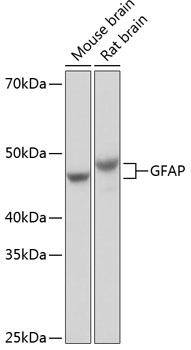Cell Biology Antibodies 17
Anti-GFAP Antibody (CAB19058)
- SKU:
- CAB19058
- Product Type:
- Antibody
- Reactivity:
- Human
- Reactivity:
- Mouse
- Reactivity:
- Rat
- Host Species:
- Rabbit
- Isotype:
- IgG
- Research Area:
- Cell Biology
Description
| Antibody Name: | Anti-GFAP Antibody |
| Antibody SKU: | CAB19058 |
| Antibody Size: | 20uL, 50uL, 100uL |
| Application: | WB IHC IF |
| Reactivity: | Human, Mouse, Rat |
| Host Species: | Rabbit |
| Immunogen: | A synthesized peptide derived from human GFAP |
| Application: | WB IHC IF |
| Recommended Dilution: | WB 1:500 - 1:2000 IHC 1:50 - 1:200 IF 1:50 - 1:200 |
| Reactivity: | Human, Mouse, Rat |
| Positive Samples: | Mouse brain, Rat brain, U-251MG |
| Immunogen: | A synthesized peptide derived from human GFAP |
| Purification Method: | Affinity purification |
| Storage Buffer: | Store at -20°C. Avoid freeze / thaw cycles. Buffer: PBS with 0.02% sodium azide, 0.05% BSA, 50% glycerol, pH7.3. |
| Isotype: | IgG |
| Sequence: | Email for sequence |
| Gene ID: | 2670 |
| Uniprot: | P14136 |
| Cellular Location: | |
| Calculated MW: | 50kDa |
| Observed MW: | 48kDa |
| Synonyms: | ALXDRD, GFAP |
| Background: | This gene encodes one of the major intermediate filament proteins of mature astrocytes. It is used as a marker to distinguish astrocytes from other glial cells during development. Mutations in this gene cause Alexander disease, a rare disorder of astrocytes in the central nervous system. Alternative splicing results in multiple transcript variants encoding distinct isoforms. [provided by RefSeq, Oct 2008] |
| UniProt Protein Function: | GFAP: a class-III intermediate filament protein. A cell-specific marker that, during the development of the central nervous system, distinguishes astrocytes from other glial cells. Mutations in this gene cause Alexander disease, a rare disorder of astrocytes in the central nervous system. An additional transcript variant isoform has been described, but its full length sequence has not been determined. |
| UniProt Protein Details: | Protein type:Cytoskeletal Chromosomal Location of Human Ortholog: 17q21 Cellular Component: membrane; cytoplasm; intermediate filament; cytosol Molecular Function:integrin binding; structural constituent of cytoskeleton; kinase binding Biological Process: Bergmann glial cell differentiation; extracellular matrix organization and biogenesis; regulation of neurotransmitter uptake; response to wounding; intermediate filament organization; neurite regeneration; astrocyte development Disease: Alexander Disease |
| NCBI Summary: | This gene encodes one of the major intermediate filament proteins of mature astrocytes. It is used as a marker to distinguish astrocytes from other glial cells during development. Mutations in this gene cause Alexander disease, a rare disorder of astrocytes in the central nervous system. Alternative splicing results in multiple transcript variants encoding distinct isoforms. [provided by RefSeq, Oct 2008] |
| UniProt Code: | P14136 |
| NCBI GenInfo Identifier: | 121135 |
| NCBI Gene ID: | 2670 |
| NCBI Accession: | P14136.1 |
| UniProt Secondary Accession: | P14136,Q53H98, Q5D055, Q6ZQS3, Q7Z5J6, Q7Z5J7, Q96KS4 Q96P18, Q9UFD0, B2RD44, D3DX59, E9PAX3, |
| UniProt Related Accession: | P14136 |
| Molecular Weight: | 432 |
| NCBI Full Name: | Glial fibrillary acidic protein |
| NCBI Synonym Full Names: | glial fibrillary acidic protein |
| NCBI Official Symbol: | GFAP |
| NCBI Protein Information: | glial fibrillary acidic protein |
| UniProt Protein Name: | Glial fibrillary acidic protein |
| Protein Family: | Glial fibrillary acidic protein |
| UniProt Gene Name: | GFAP |
| UniProt Entry Name: | GFAP_HUMAN |







